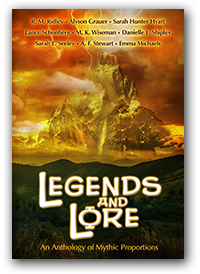The following was written by Penny Freeman and is reposted from the blog of Xchyler Publishing, dated October 14, 2014.

DEFINING VOICE
If you follow The X Blog at all, you may have noticed that our editors write about voice a lot. A lot. Why? Because finding your own voice as an author is critical. And, as an editor, respecting that voice is equally important. However, getting to that point where the voice is to be respected, rather than cultivated, is the tricky part.
So, what exactly is voice? A lot of things, actually. Here are a few ingredients that are thrown into that concoction we call ‘voice.’
- Your characters’ vocabulary. The words you put in their mouths.
- Your vocabulary. The words that you, as the writer, employ in your narrative.
- Your grammar. How do you follow the rules? How do you break (or employ) them with purpose?
- Your content. What do you write about? Do you develop rich, complex worlds or focus on keeping the action moving? Is your work character– or plot-driven? Do you get down in the trenches to really explore your character’s soul? Or do you analyze the action from a distance, carefully staying above the fray? Are you a ‘just the facts, ma’am’ sort of writer, or are you always asking why?
- Your genre. Stephen King, John Grisham, Michael Crichton, Tom Clancy, Nora Ephron, Danielle Steel, J. K. Rowling. You see these names on the cover and you instantly know what type of story is inside. Perhaps, if you have read that author extensively, you can hear their voice in your head without cracking the book.
- Your ethos. What do you believe in? What drives you? How does that influence infuse your writing? These authors leave no doubt as to their personal philosophies: C. S. Lewis, J. R. R. Tolkein, Ayn Rand. Whom else can you name off the top of your head?
That’s a fairly hefty list of ingredients, so let’s start with the easiest: character vocabulary and linguistic style.
A character’s ‘voice’ gives them history. Often times, allowing your reader to ‘hear’ them speak introduces your character, far better than a lengthy narrative. You can reveal their gender, their heritage, their level of education, their social strata, their attitudes about life, even the era in which they lived simply by putting the right words in their mouths. Let’s take a look at some examples.
Message to communicate: I’ve had a bad day. I can’t come.
Voice 1: Dear Sirs, I regret to inform you that, due to circumstances beyond my control, I am compelled to cancel our scheduled appointment. Please accept my most sincere apologies for this inconvenience. I hope you can recalendar our consultation. Please contact me at your earliest convenience, and I will adjust my schedule to accommodate yours.
Voice 2: Gah! I’ve had the most horrendous day! Everything has gone wrong and I’m about to explode. I’m stuck here at the garage while they fix a blowout, I’m already an hour late getting Jeff, and the kids are screaming for dinner. I spent 30 freaking minutes waiting for the tow truck!! OnStar my eye. I soooo need our night out, but I just can’t swing it. Please don’t hate me. We will do it, I swear.
Voice 3: Dude! Totally gnarly day and I’m slammed. Tonight’s tanked. Gotta catch some z’s. Call me back, bro, and we’ll hook up. We gotta hang!
In #1, your can see the executive sitting behind a huge desk, talking into a Dictaphone, her jacket probably thrown across an etegere, or the secretary stationed just outside the door, clacking away at the keyboard, well-trained in making his boss look good. #2 blares soccer mom, minivan, 2.5 kids, and a Labra-doodle. She’s probably texting on her smart phone. With #3, you can almost smell the board wax, Coppertone, and rubber wetsuits, and hear the beep from the answering machine. But the actual text mentioned none of these things.
If a picture is worth a thousand words, in a writing context, a quote is a snapshot of a character.
But, be careful. When developing a character’s voice, ask yourself these questions:
- Would my character use these words? If you’re writing a street urchin growing up in the alleys of Whitechapel, he’s not going to have the vocabulary of Little Lord Fontleroy. Likewise, the Duke of Buckingham isn’t going to talk like a fishwife. Even when writing science fiction and fantasy, be consistent, and allow differences in speech patterns to give both your characters and your world history.
- Will these words (or grammar) get in the way of the story? Will the ‘voice’ resonate with the reader and draw them deeper into the story? Or will they have to stop and reread a sentence or paragraph to try and understand your meaning? Be authentic—to a point. Be cognizant of when exacting is too much. Just, think how, maddening, it would, be, if someone, wrote the way, William Shatner, talks, in real life.
- Am I accurate or insulting? Am I propogating a stereotype? People from different geographical regions talk differently, but learn about the area and its people you’re portraying before you put words in their mouths. Citizens of the South don’t all sound like rednecks, any more than all inner-city mavens speak gangsta, and just because a character uses either of these accents doesn’t mean they’re stupid. If you want to make someone sound intellectually challenged, do it with what they talk about, the questions they ask, how they express themselves, not their accent. Likewise, not all highly intelligent, well-educated people speak like a walking thesaurus from Nob Hill, and just because you’re from the Upper East Side doesn’t mean you can carry on a coherent conversation. Demonstrating your awareness of these nuances adds richness and texture to your writing that the reader will savor.
 In my next post, we’ll discuss writing in the vernacular, some of the do’s, some of the don’ts, but most especially how to let your reader ‘hear’ the characters’ voice without you, the writer, getting in the way.
In my next post, we’ll discuss writing in the vernacular, some of the do’s, some of the don’ts, but most especially how to let your reader ‘hear’ the characters’ voice without you, the writer, getting in the way.
In the meantime, in the comments below, write ‘I have to cancel’ in a specific voice. How many characters can you create just by choosing the right constellation of words?
Editor-in-chief Penny Freeman lives, writes, edits, and markets from her home in southeast Texas. She currently supervises several editorial projects, including our most recent invitation-only anthology contest, Mechanized Masterpieces 2: An American Anthology. Her next release, Legends and Lore: An Anthology of Mythic Proportions, is slated for release October 22, 2014.

Penny Freeman
Author, Editor, Designer



Recent Comments